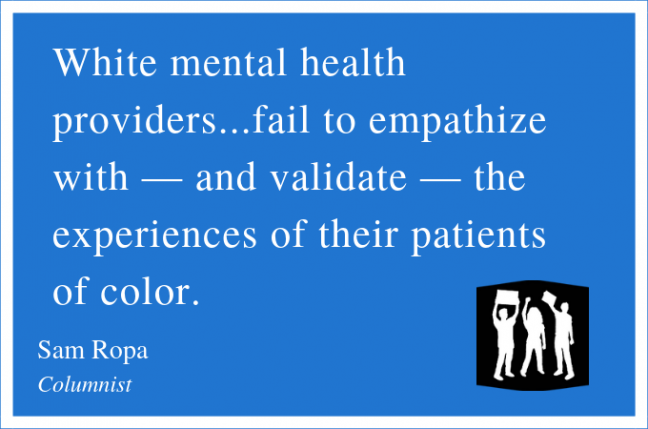Most conversations about access to mental health treatment at the University of Wisconsin — whether they take place on the meme page or in student government — are concerned with the limited resources the university dedicates to student mental health services, most notably the counseling and psychiatric services provided through University Health Services.
But amidst general frustration about UW’s disregard for student mental health are a number of voices calling on UW to address racial and ethnic disparities in mental health treatment — that UHS mental health services are uniquely failing students of color.
These voices are badly, badly needed.
Researchers agree that people who experience everyday racism, or microaggressions, are more likely to show symptoms of anxiety and depression. In a 2017 article, Marva Robinson described struggling every day “against a known traumatic event called racism … At every turn you’re reminded that you are a second-class citizen and you don’t have access to things that you should. That’s damaging to the psyche.”
The same is true of students of color at UW. In the 2018 “Health Minds Study,” UW researchers reported on the disproportionate mental health burden faced by Black, Latinx and Native students. All of these groups, the report found, screen positively for depression and anxiety, and are “overwhelmingly more likely” to have suicidal ideation.
A major problem: Students of color feel unwelcome on campus and in the classroom
Black UW students were more likely than any other racial or ethnic group to report experiencing these mental health problems.
But even the research that addresses the unique mental health problems people and students of color face rarely identify white supremacy, the existing social system that delivers the benefits of whiteness to white people, as the purveyor of their trauma. Naming the effect of racism — students of color struggling with depression, anxiety and suicidal ideation at vastly higher rates than white students — without naming the systemic cause neglects the depth of the changes that must be made to student mental health services.
One manifestation of white supremacy in American society, and at UW, is cultural racism — when a dominant social group shapes norms, values and standards to the advantage of white people. Doing this allows white people to assign normality to the behavior of white people, and to rationalize the mistreatment of people of color. Unable to validate the thoughts and emotions of people of color — especially when the emotions relate to traumas of racism — it becomes impossible for white people to fully empathize with people of color.
White mental health providers, wherever they are employed, aren’t immune to this form of racism. In some extreme instances, they characterize the struggle against racism as a mental illness (see “protest psychosis” and the racist history of schizophrenia diagnoses), but more often they fail to empathize with — and validate — the experiences of their patients of color.
At UW, many students of color often request counselors of color from UHS, knowing that these counselors will empathize more deeply with their experiences — particularly the feeling of isolation that comes from existing in a predominantly white institution, in a predominantly white community. Before UHS hired a mental health provider, Corey Steele, to focus specifically on students of color, these requests were usually denied.
The university’s inability to meet the mental health needs of students of color has had fatal consequences. In 2016, Isabel Denning, a member of the Oneida Nation, committed suicide after facing financial insecurity and the trauma of multiple sexual assaults. Those who knew her said the racism and isolation she experienced at UW contributed to her declining mental health and to her eventual suicide.
Isabel sought treatment with UHS, but was dropped, according to The Badger Herald, over “cultural differences and miscommunication.”
I do not know, truly, how racism affects individual mental health. I am white — and my anxiety disorder is not the result or effect of systemic oppression. But I know what it is to benefit from a mental health system made in my image.
The counselors I have seen have never questioned my choice to use or abstain from psychiatric treatment. I have always seen a counselor who looked and spoke like me. Even when I have been questioned and challenged by counselors, I never felt as though they considered me irrational or undeserving of care. I’ve never visited a therapist who couldn’t empathize with my experience as an anxious white person.
Students of color who visit white counselors can’t say this. Their traumas go untreated, or invalidated, deepening their sense of isolation and hopelessness. These students need more mental health professionals of color. Counselors and psychiatrists who recognize the trauma wrought by racism can empathize with students living through it.
Sam Ropa ([email protected]) is a senior majoring in geography and anthropology.




















